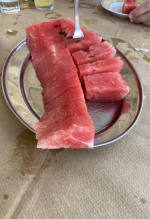I have always found the concept of kefi to be intriguing, and I would like to learn more about it from those familiar or even vaguely aware of this notion. From what little I understand, kefi seems to embody a unique blend of joy, spirit, and passion, deeply ingrained in Greek culture. It's more than just a word; it's a lifestyle, a form of expression, an unbridled enthusiasm for life.
However, I'm curious to know about the deeper nuances and applications of kefi. How does kefi manifest in day-to-day life, not just in Greece, but wherever one might find joy and enthusiasm? Is it something that can be consciously cultivated, or does it spontaneously bloom in moments of happiness and high spirits? It seems like it really permeates the culture, especially in Greece.
 This pic is from two summers ago, oh how I wish I could go back
This pic is from two summers ago, oh how I wish I could go back



